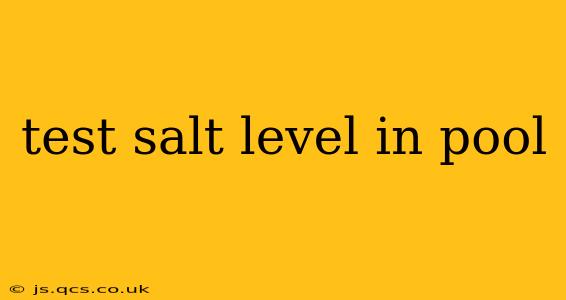Maintaining the proper salt level in your saltwater pool is crucial for the efficient operation of your chlorine generator and the overall health of your pool. Too little salt, and your system won't produce enough chlorine; too much, and you risk damaging your equipment and irritating swimmers. This guide will walk you through everything you need to know about accurately testing your pool's salt level.
What is the ideal salt level for a saltwater pool?
The ideal salt level for a saltwater pool typically ranges from 2,700 to 3,400 parts per million (ppm). However, always consult your pool equipment manufacturer's instructions, as the ideal range may vary slightly depending on the specific model of your chlorine generator. Operating outside this range can significantly impact the performance of your system.
How often should I test my pool's salt level?
You should test your pool's salt level at least once a month, and more frequently during periods of heavy use or significant rainfall. Rainfall can dilute the salt concentration, while heavy use can increase chlorine demand, potentially leading to salt depletion. Regular testing allows for proactive adjustments, preventing problems before they arise.
What equipment do I need to test my pool's salt level?
You'll need a reliable salt test kit. There are several types available, including test strips, liquid test kits, and digital meters. While test strips are convenient, liquid test kits and digital meters generally provide more accurate readings. Choose a kit specifically designed for measuring salt levels in pools. Don't use kits intended for other applications, such as saltwater aquariums, as the measurement scales will differ.
How do I use a saltwater pool test kit?
The specific instructions will vary depending on the type of test kit you're using, so carefully follow the manufacturer's instructions. Generally, you'll collect a water sample from your pool and add the testing reagent according to the kit's directions. Compare the resulting color or reading to the kit's chart to determine your salt level. Ensure you are taking the sample from a location that isn't directly influenced by the return jets.
What if my salt level is too low?
If your salt level is too low, you'll need to add more salt to your pool. The amount of salt needed will depend on the size of your pool and the difference between your current level and the ideal range. It’s best to add salt gradually over several days to avoid overwhelming your system. Use pool-grade salt; using other types of salt can damage your equipment.
What if my salt level is too high?
If your salt level is too high, you'll need to dilute the water. The most effective method is to drain a portion of your pool water and replace it with fresh water. This should be done gradually to avoid shocking the system. The amount of water to drain will depend on how high your salt levels are. Always consult with a pool professional for advice on how to safely dilute your pool water.
Can I use table salt in my saltwater pool?
No, it is strongly discouraged to use table salt in your saltwater pool. Table salt often contains additives that can damage your pool equipment and compromise the quality of your water. Always use pool-grade salt, which is specifically formulated for use in saltwater pools.
How much salt should I add to raise the level?
The amount of salt needed to raise your pool's salt level depends on several factors, including your pool's size and the current salt concentration. Most pool calculators (available online) can estimate the salt needed based on these parameters. It's crucial to add salt gradually and retest after a few days to avoid over-correction.
What are the signs of an improper salt level in my pool?
Signs of an improper salt level can include: reduced chlorine production (indicated by cloudy water or persistent algae growth), chlorine generator error messages, and corrosion of your pool equipment.
This guide provides a general overview of testing your pool's salt level. Always refer to your pool equipment manufacturer's instructions for specific recommendations and safety precautions. If you're unsure about any aspect of maintaining your saltwater pool, consult a qualified pool professional.
